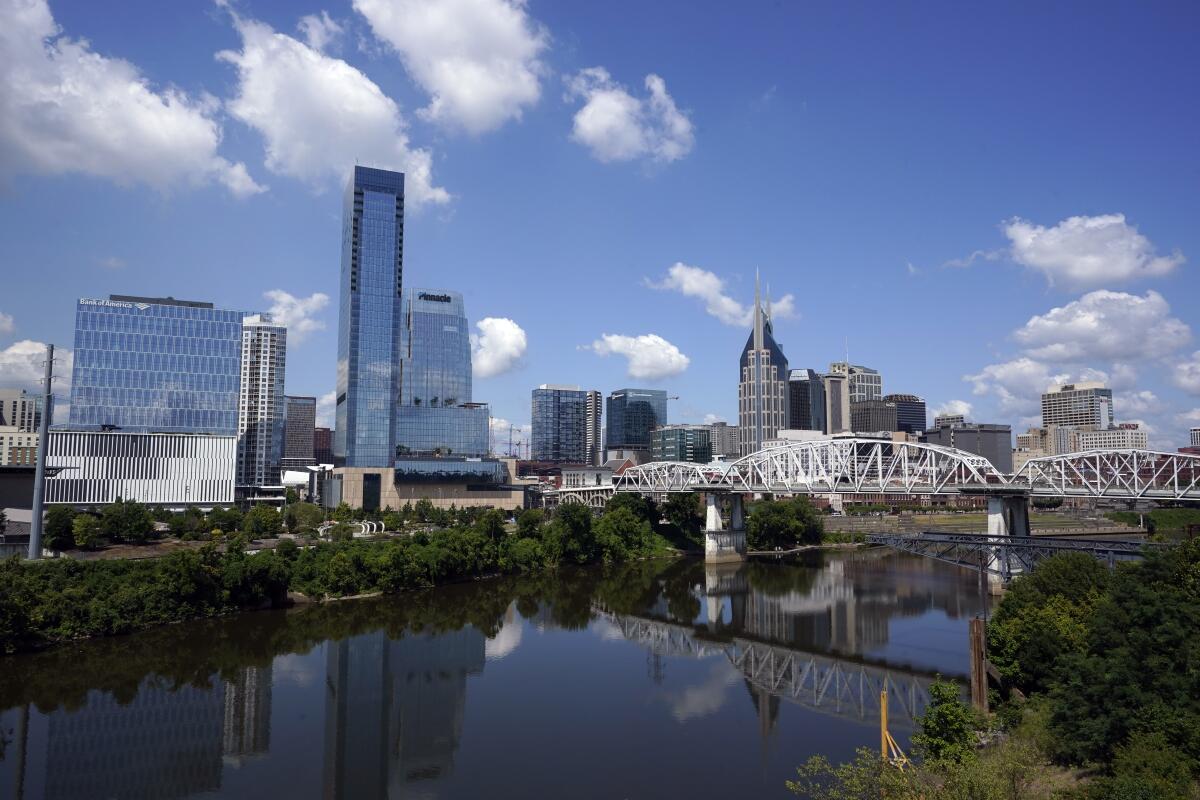College costing nearly $100,000 a year? Forgiving loans is the least we can do

- Share via
President Biden is at it again with student loan forgiveness.
Last summer, the Supreme Court ruled that he couldn’t use the HEROES Act — passed after 9/11, just as the Iraq War was escalating — to forgive federal student loan debt for roughly 20 million borrowers. Since then, his administration has been exploring other mechanisms to provide piecemeal relief. In February, he introduced the SAVE Plan, which helped nearly 153,000. This week, he outlined plans that could lift a financial burden off the shoulders of more than 30 million people in a country where more than 70% of people live check to check.
Opinion Columnist
LZ Granderson
LZ Granderson writes about culture, politics, sports and navigating life in America.
Some conservatives have accused Biden of trying to buy votes — as if Donald Trump offering tax breaks to a room full of billionaires was a policy-motivated decision. Others point out the president is only doing this to fulfill a campaign promise, which, for some reason, I thought was part of the job.
However, the most prevalent response to Biden’s attempt to forgive student loan debt is summed up in this quote from Malcolm X: “Envy blinds men and makes it impossible for them to think clearly.”
Americans are supplying the weapons that enable Israel’s war. In exchange, Israel should show that it is pursuing peace.
Nearly 60% of graduates of public universities in Texas had nearly $25,000 in loan debt in 2021. Almost 1.4 million Texans would have gotten relief from Biden’s first attempt. Two Texans with student loan debt sued the administration because they weren’t eligible. The case was tossed. But the suit highlights just how much this conversation is about individual fairness as opposed to societal benefit.
In America, the childless pay for schools they don’t need, and city dwellers pay for county roads they’ll never drive on. That kind of economic cooperation is needed in a land as vast as ours. Economist and author Robert H. Frank often writes about how the shift from society to self in our policies has really undermined our ability to be happy for others. And stats over the last 50 years support it. From 1949 to 1979, the incomes of the bottom 20% grew faster than those of the top 1%. That started to flip with the trickle-down economic policies of Ronald Reagan.
I joined the president for a couple of campaign stops aimed at inspiring turnout among LGBTQ+ and Black residents. A few hundred votes here could tip the general election.
The rich got richer because the poor got poorer. But because it appeared everyone on television and in magazines was doing so well, relative deprivation — feeling the need to “keep up with the Joneses” — replaced common sense.
Our homes got bigger even though our salaries didn’t because we took out bigger mortgages. Our credit card debt has exploded. And now some private colleges, such as Vanderbilt in Nashville, Tenn., are flirting with $100,000-a-year price tags. This threatens to anchor a generation to debt that may take a lifetime to pay off. Can you imagine beginning your working life with $400,000 in debt and only a bachelor’s degree to show for it?
We know too much about Trump to pretend he might manage the economy. He ruined businesses, tanked the budget and has now been exposed as a fraud.
Student loan debt isn’t an impediment to the ultra-rich, who pay out of pocket for college, or even for many in the upper middle class, who have connections to turn their $400,000 degree into a $200,000-a-year starter job.
But for the bottom 20% of earners in our society, people who once had a chance to climb up the economic ladder, college has become a treacherous option. They need the degree to have any hope of getting ahead over their lifetimes; an undergraduate degree is like a sail to speed up their earnings. But the debt that now comes with a degree is an unforgiving anchor slowing them down.
That may appear like a personal problem for people who grow up in those lowest-earning households. But like public schools and country roads, we all need college to be accessible for people from all economic backgrounds. Out-of-control college costs and crushing student debt are everyone’s problem.
The annual cost to attend eight of our best schools averages more than $90,000. Today Americans are carrying nearly $2 trillion in debt ($150 billion just among Californians) for something that was once so affordable, a one-parent income could cover tuition for multiple children and still pay the mortgage.
Those days are long gone. What’s been put in its place is unsustainable. Biden’s attempts to forgive student loan debt don’t heal the wound or stop the damage to students of today and tomorrow, but they slow the bleeding for workers whose paychecks vanish into servicing insurmountable student loans.
Biden’s latest effort won’t directly help me. It may not help you. But should we let envy cloud our minds? Any help with college costs and loans is better for society as a whole than none. Why is it so hard for people to be happy for others?
More to Read
A cure for the common opinion
Get thought-provoking perspectives with our weekly newsletter.
You may occasionally receive promotional content from the Los Angeles Times.














